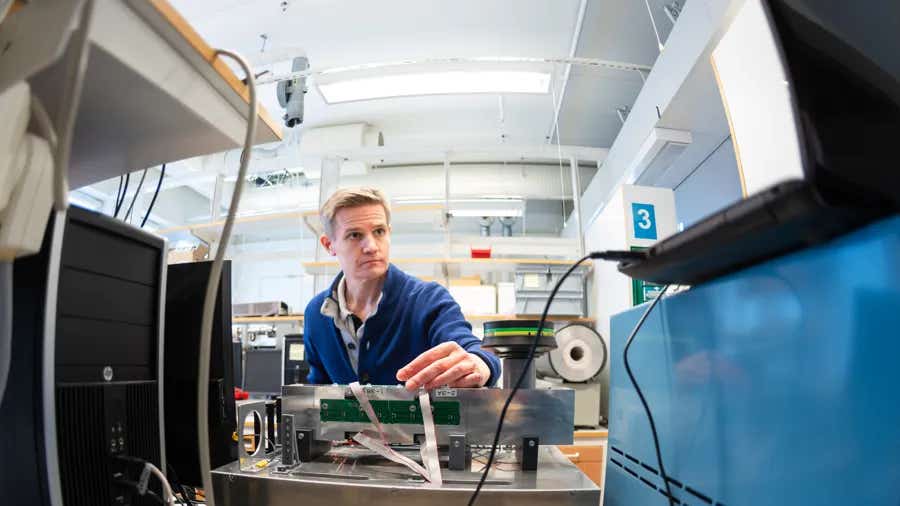Research findings combat age-related metabolic diseases and enhance healthy aging
This research offers a deeper understanding of the intricate relationship between energy metabolism, aging, and the regulation of lifespan.

[Dec. 1, 2023: JD Shavit, The Brighter Side of News]
This research offers a deeper understanding of the intricate relationship between energy metabolism, aging, and the regulation of lifespan. (CREDIT: Creative Commons)
A groundbreaking study conducted by researchers at the Hebrew University of Jerusalem (HU) has unveiled a promising avenue for combating age-related metabolic diseases and promoting healthy aging. This research offers a deeper understanding of the intricate relationship between energy metabolism, aging, and the regulation of lifespan.
Led by Dr. Itamar Harel from HU's Silberman Institute, the study delves into the role of AMP biosynthesis in vertebrate lifespan and metabolic health, opening up exciting possibilities for future interventions. Published in the prestigious journal Developmental Cell under the title "Genetic perturbation of AMP biosynthesis extends lifespan and restores metabolic health in a naturally short-lived vertebrate," this research promises to reshape our approach to aging-related health issues.
Aging is a complex biological process often associated with disruptions in metabolic homeostasis, which can lead to various health problems. At the heart of this study lies the AMP-activated protein kinase (AMPK), a critical player in cellular energy regulation and overall organismal metabolism.
While previous attempts to genetically manipulate the AMPK complex in mice did not yield favorable outcomes, Dr. Harel and his team embarked on a different path. Their innovative approach involved manipulating the upstream nucleotide pool to modulate energy homeostasis—a process that governs the balance between energy intake (food consumption) and energy expenditure (metabolic activity).
Related Stories
To explore this concept further, the research team turned to an unconventional model organism: the turquoise killifish. These small fish, native to Africa, southern Europe, and America, are known for their unique reproductive strategy in which mothers release undeveloped eggs. Leveraging this model, the scientists honed in on APRT, a key enzyme involved in AMP biosynthesis, and manipulated it in the turquoise killifish.
Remarkably, this genetic manipulation resulted in a significant extension of lifespan in heterozygous male killifish. To gain a comprehensive understanding of the underlying changes, the study employed an integrated omics approach. This term refers to a combination of high-throughput techniques, including RNA sequencing, Metabolomics, and Lipidomics. In this instance, it involved adopting a metabolic profile akin to fasting and enhancing resistance to a high-fat diet.
At the cellular level, the heterozygous fish exhibited striking characteristics such as heightened nutrient sensitivity, reduced ATP levels, and activation of AMPK. These findings underscore the potential of manipulating AMP biosynthesis to modulate vertebrate lifespan and bolster metabolic health.
Graphical Abstract: Reduction of APRT expression in the turquoise killifish promotes longevity. (CREDIT: Developmental Cell)
Dr. Harel expressed his enthusiasm, stating, "This is the first long-lived genetic model in killifish, highlighting the potential of this emerging model for aging research. Genetic manipulation of AMP biosynthesis in the turquoise killifish reveals remarkable effects on lifespan and metabolic health. Our study unravels the intricate interplay between energy metabolism, aging, and lifespan regulation, offering exciting possibilities for the development of interventions to combat age-related metabolic diseases and enhance healthy aging."
Nevertheless, this groundbreaking research also brought to light an intriguing observation. The benefits of extended lifespan and rejuvenated metabolic functions were nullified when lifelong intermittent fasting was applied. Moreover, the longevity outcomes were found to be sex-specific. These discoveries underscore the complexity of the underlying mechanisms and emphasize the delicate balance required for optimizing health outcomes, which can vary between males and females.
Led by Dr. Itamar Harel from HU's Silberman Institute, the study delves into the role of AMP biosynthesis in vertebrate lifespan and metabolic health. (CREDIT: Hebrew University of Jerusalem)
This study has illuminated the potential of targeting APRT as a promising strategy for promoting metabolic health and extending lifespan in vertebrates. Further investigations in this field hold great promise for the development of interventions that enhance healthy aging and combat age-related metabolic diseases.
The findings of this research are poised to revolutionize our approach to aging-related health issues. By shedding light on the role of AMP biosynthesis in lifespan and metabolic health, scientists may be one step closer to developing interventions that allow individuals to age gracefully while minimizing the impact of age-related metabolic diseases. The turquoise killifish, with its unique genetic characteristics, serves as a valuable model organism in this quest for a healthier and longer life.
To explore this concept further, the research team turned to an unconventional model organism: the turquoise killifish. (CREDIT: Creative Commons)
As we continue to unravel the mysteries of aging, studies like this one remind us of the immense potential that lies within our genes and metabolic pathways.
The future of healthy aging may indeed be within our grasp, thanks to the groundbreaking work of Dr. Itamar Harel and his team at the Hebrew University of Jerusalem. As they continue to explore the intricacies of AMP biosynthesis and its impact on lifespan, we can look forward to a brighter and healthier future for aging individuals worldwide.
Note: Materials provided above by The Brighter Side of News. Content may be edited for style and length.
Like these kind of feel good stories? Get the Brighter Side of News' newsletter.



